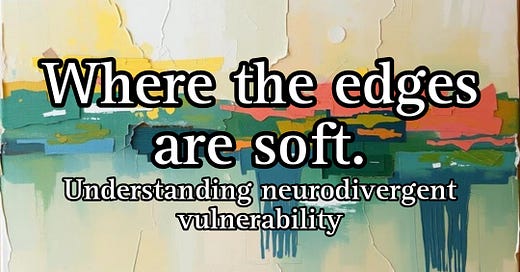There’s a kind of vulnerability that doesn’t always look like fragility. It might walk into a room, bright-eyed and curious, asking questions others are too polite or too performative to voice. It might say “yes” when it means “maybe,” or stay silent when its needs feel too big, too inconvenient, too easily misunderstood. This is the vulnerability of many neurodivergent people because the world forgets how to listen to difference.
Neurodivergent vulnerability often hides in plain sight. It lives in the social pauses that stretch too long. In the smile that covers confusion or panic. In the rigid script repeated under pressure. In the shutdown and the burnout.
SENDwise Hub is a reader-supported publication. To receive new posts and support my work, consider becoming a free or paid subscriber.
It shows up in the small, unnoticed moments..
When a child trusts a teacher who doesn’t believe them.
When someone misses a subtle social rule and is punished with exclusion.
When a person masks their distress for so long, they start to believe the mask is all there is.
When a need is voiced plainly and others choose to ignore it because it didn’t sound as expected.
Sometimes, this vulnerability is sensory.
When the lights are too bright.
The sounds too sharp.
The smells too strong.
The clothes too itchy.
The room too loud to hear yourself think.
Sometimes, it’s emotional.
When the words won’t come fast enough.
When processing takes time and silence is mistaken for apathy.
When someone else decides for you before you've even had a chance to decide for yourself.
And sometimes, it’s systemic.
When services ask you to prove your difficulties and differences before offering support.
When support is conditional on your ability to perform distress in the right way.
When you are only granted accommodations if your pain is visible, palatable and well-articulated in neurotypical terms.
And then there’s the internal kind of vulnerability.
The kind that festers over years of not being believed.
Of being told you’re too much, too sensitive, too difficult, too slow.
Of learning to second-guess your instincts.
Of internalising the message that safety only comes when you stay small, stay quiet, stay hidden.
This vulnerability calls for softness not scrutiny.
For curiosity not correction.
For systems that honour autonomy.
For relationships built on real consent.
For communities that celebrate the ways you stim, speak, pause and protect yourself.
Spaces where being honest about what you need isn’t treated as inconvenient.
Where communication differences aren’t just accepted, they’re expected.
Where the right to exist without performing is never up for negotiation.
To recognise neurodivergent vulnerability is to understand where harm enters.
But it’s also to see where care, dignity, agency and identity can take root.
Recognising it also means understanding its impact..
Internalised shame and hyper-vigilance
When the world repeatedly misunderstands or punishes your natural ways of being, you learn to shrink yourself. To question your own experience. To anticipate rejection before it even arrives. It becomes hard to know what’s a real feeling and what’s self-protection.
Increased risk of abuse
Neurodivergent people are disproportionately at risk of being mistreated, coerced or violated. When boundaries aren’t believed, when distress is dismissed, when consent isn’t sought, vulnerability turns to danger.
Barriers to autonomy
When people see you as less capable or too complex, they often make decisions for you, not with you. That robs you of agency, dignity and the right to shape your own life. Infantilisation is not care. Control is not protection.
Burnout and trauma
Trying to survive in a world that constantly demands you mask, adapt and over-explain takes its toll. The exhaustion runs deep. You are not lazy or disengaged. Your body and mind are being pushed past their limit, again and again.
You deserve support that doesn’t come at the cost of your identity.
You deserve safety that doesn’t require silence.
You deserve to be believed the first time.
And you deserve to live in a world where the edges are soft.
💥 If you are looking for neuro-affirming digital resources sent right to your inbox, I am running a Spring Sale that ends on Sunday, 13th April. Click on the link and come have a browse!
💥 There is still time to vote for the National Diversity Awards. The beautiful thing is you can vote for multiple nominees!
💥 If you’re on any social media, come join me on Facebook, Instagram or LinkedIn.





Excellent post as a teacher all makes sense 🌸
I relate so hard to your note about hypervigilance.